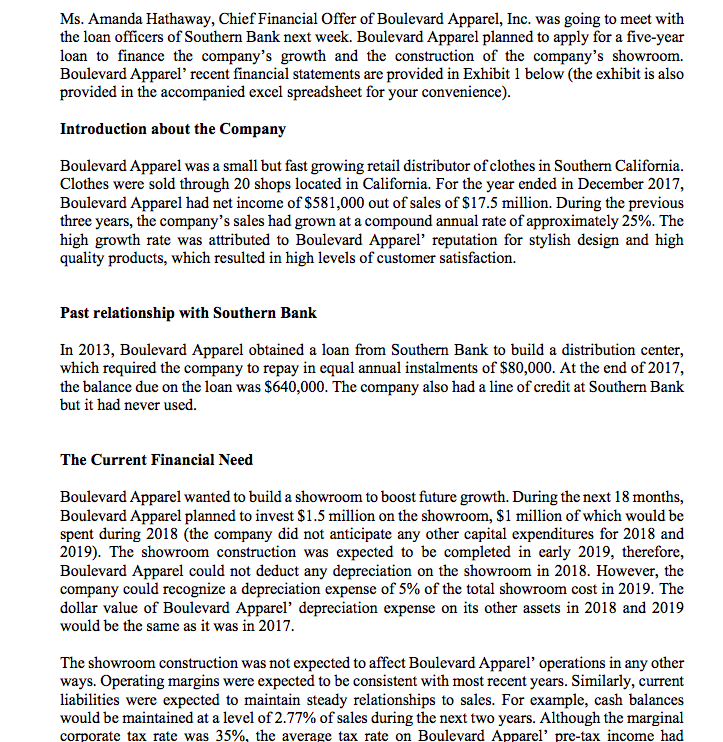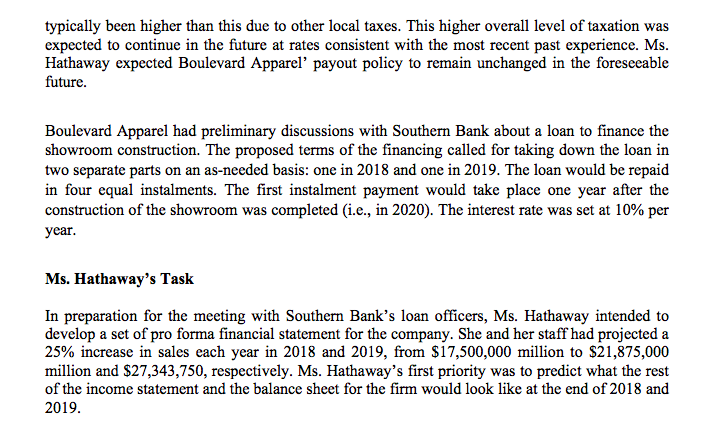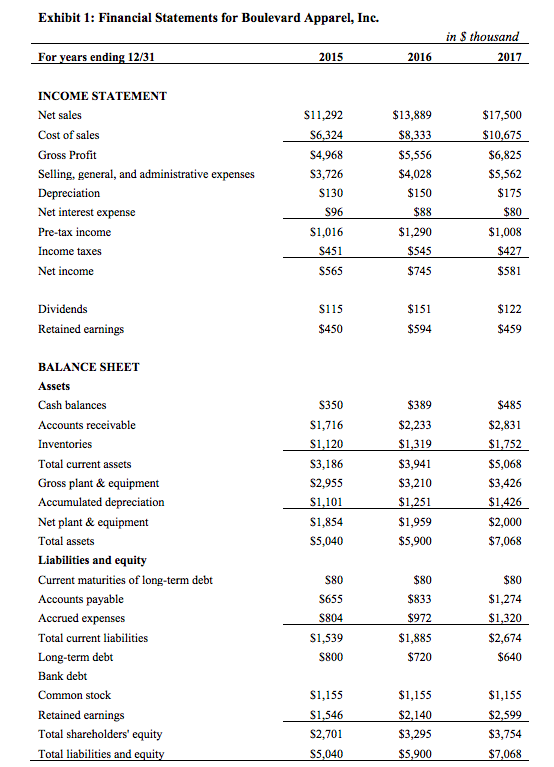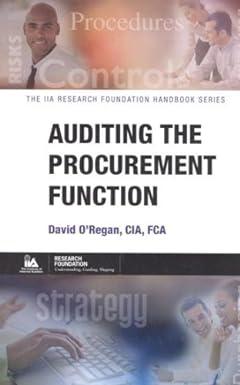Question
1. Perform financial ratios analysis and tabulate the results. Based on your calculations, evaluate Boulevard Apparel financial health. 2. Based on Ms. Amanda Hathaways prediction



1. Perform financial ratios analysis and tabulate the results. Based on your calculations, evaluate Boulevard Apparel financial health.
2. Based on Ms. Amanda Hathaways prediction for 2018 sales of $21,875,000, and for 2019 sales of $27,343,750, and relying on the other assumptions provided in the Boulevard Apparel case, prepare Boulevard Apparel 2018 and 2019 pro-forma income statements and year-end balance sheets. As a preliminary assumption, assume any new financing required will be in the form of bank debt. Assume all debt (i.e., existing debt and any new bank debt bears interest at the same rate of 10%).
Ms. Amanda Hathaway, Chief Financial Offer of Boulevard Apparel, Inc. was going to meet with the loan officers of Southern Bank next week. Boulevard Apparel planned to apply for a five-year loan to finance the company's growth and the construction of the company's showroom. Boulevard Apparel' recent financial statements are provided in Exhibit 1 below the exhibit is also provided in the accompanied excel spreadsheet for your convenience). Introduction about the Company Boulevard Apparel was a small but fast growing retail distributor of clothes in Southern California. Clothes were sold through 20 shops located in California. For the year ended in December 2017, Boulevard Apparel had net income of $581,000 out of sales of $17.5 million. During the previous three years, the company's sales had grown at a compound annual rate of approximately 25%. The high growth rate was attributed to Boulevard Apparel reputation for stylish design and high quality products, which resulted in high levels of customer satisfaction. Past relationship with Southern Bank In 2013, Boulevard Apparel obtained a loan from Southern Bank to build a distribution center, which required the company to repay in equal annual instalments of $80,000. At the end of 2017, the balance due on the loan was $640,000. The company also had a line of credit at Southern Bank but it had never used. The Current Financial Need Boulevard Apparel wanted to build a showroom to boost future growth. During the next 18 months, Boulevard Apparel planned to invest $1.5 million on the showroom, $1 million of which would be spent during 2018 (the company did not anticipate any other capital expenditures for 2018 and 2019). The showroom construction was expected to be completed in early 2019, therefore, Boulevard Apparel could not deduct any depreciation on the showroom in 2018. However, the company could recognize a depreciation expense of 5% of the total showroom cost in 2019. The dollar value of Boulevard Apparel depreciation expense on its other assets in 2018 and 2019 would be the same as it was in 2017. The showroom construction was not expected to affect Boulevard Apparel operations in any other ways. Operating margins were expected to be consistent with most recent years. Similarly, current liabilities were expected to maintain steady relationships to sales. For example, cash balances would be maintained at a level of 2.77% of sales during the next two years. Although the marginal corporate tax rate was 35%, the average tax rate on Boulevard Apparel' pre-tax income had typically been higher than this due to other local taxes. This higher overall level of taxation was expected to continue in the future at rates consistent with the most recent past experience. Ms. Hathaway expected Boulevard Apparel payout policy to remain unchanged in the foreseeable future. Boulevard Apparel had preliminary discussions with Southern Bank about a loan to finance the showroom construction. The proposed terms of the financing called for taking down the loan in two separate parts on an as-needed basis: one in 2018 and one in 2019. The loan would be repaid in four equal instalments. The first instalment payment would take place one year after the construction of the showroom was completed (i.e., in 2020). The interest rate was set at 10% per year. Ms. Hathaway's Task In preparation for the meeting with Southern Bank's loan officers, Ms. Hathaway intended to develop a set of pro forma financial statement for the company. She and her staff had projected a 25% increase in sales each year in 2018 and 2019, from $17,500,000 million to $21,875,000 million and $27,343,750, respectively. Ms. Hathaway's first priority was to predict what the rest of the income statement and the balance sheet for the firm would look like at the end of 2018 and 2019. Exhibit 1: Financial Statements for Boulevard Apparel, Inc. in thousand For years ending 12/31 2015 2016 2017 $13,889 $17,500 INCOME STATEMENT Net sales Cost of sales Gross Profit Selling, general, and administrative expenses Depreciation Net interest expense Pre-tax income Income taxes Net income $11,292 S6,324 $4,968 $3,726 S130 S96 $1,016 S451 S565 $8,333 $5,556 $4,028 $150 $88 $1,290 $545 $10,675 $6,825 $5,562 $175 $80 $1,008 $427 $581 $745 S115 $151 Dividends Retained earnings $122 $459 $450 $594 S350 $389 $485 $1,716 $1,120 $3,186 $2,955 $1,101 S1,854 $5,040 $2,233 $1,319 $3,941 $3,210 $1,251 $1,959 $5,900 $2,831 $1,752 $5,068 $3,426 $1,426 $2,000 $7,068 BALANCE SHEET Assets Cash balances Accounts receivable Inventories Total current assets Gross plant & equipment Accumulated depreciation Net plant & equipment Total assets Liabilities and equity Current maturities of long-term debt Accounts payable Accrued expenses Total current liabilities Long-term debt Bank debt Common stock Retained earnings Total shareholders' equity Total liabilities and equity $80 S80 S655 $833 $972 S804 $80 $1,274 $1,320 $2,674 $640 S1,539 S800 $1,885 $720 $1,155 $1,155 S1,546 S2,701 S5,040 $2,140 $3,295 $5,900 $1,155 $2,599 $3,754 $7,068 Ms. Amanda Hathaway, Chief Financial Offer of Boulevard Apparel, Inc. was going to meet with the loan officers of Southern Bank next week. Boulevard Apparel planned to apply for a five-year loan to finance the company's growth and the construction of the company's showroom. Boulevard Apparel' recent financial statements are provided in Exhibit 1 below the exhibit is also provided in the accompanied excel spreadsheet for your convenience). Introduction about the Company Boulevard Apparel was a small but fast growing retail distributor of clothes in Southern California. Clothes were sold through 20 shops located in California. For the year ended in December 2017, Boulevard Apparel had net income of $581,000 out of sales of $17.5 million. During the previous three years, the company's sales had grown at a compound annual rate of approximately 25%. The high growth rate was attributed to Boulevard Apparel reputation for stylish design and high quality products, which resulted in high levels of customer satisfaction. Past relationship with Southern Bank In 2013, Boulevard Apparel obtained a loan from Southern Bank to build a distribution center, which required the company to repay in equal annual instalments of $80,000. At the end of 2017, the balance due on the loan was $640,000. The company also had a line of credit at Southern Bank but it had never used. The Current Financial Need Boulevard Apparel wanted to build a showroom to boost future growth. During the next 18 months, Boulevard Apparel planned to invest $1.5 million on the showroom, $1 million of which would be spent during 2018 (the company did not anticipate any other capital expenditures for 2018 and 2019). The showroom construction was expected to be completed in early 2019, therefore, Boulevard Apparel could not deduct any depreciation on the showroom in 2018. However, the company could recognize a depreciation expense of 5% of the total showroom cost in 2019. The dollar value of Boulevard Apparel depreciation expense on its other assets in 2018 and 2019 would be the same as it was in 2017. The showroom construction was not expected to affect Boulevard Apparel operations in any other ways. Operating margins were expected to be consistent with most recent years. Similarly, current liabilities were expected to maintain steady relationships to sales. For example, cash balances would be maintained at a level of 2.77% of sales during the next two years. Although the marginal corporate tax rate was 35%, the average tax rate on Boulevard Apparel' pre-tax income had typically been higher than this due to other local taxes. This higher overall level of taxation was expected to continue in the future at rates consistent with the most recent past experience. Ms. Hathaway expected Boulevard Apparel payout policy to remain unchanged in the foreseeable future. Boulevard Apparel had preliminary discussions with Southern Bank about a loan to finance the showroom construction. The proposed terms of the financing called for taking down the loan in two separate parts on an as-needed basis: one in 2018 and one in 2019. The loan would be repaid in four equal instalments. The first instalment payment would take place one year after the construction of the showroom was completed (i.e., in 2020). The interest rate was set at 10% per year. Ms. Hathaway's Task In preparation for the meeting with Southern Bank's loan officers, Ms. Hathaway intended to develop a set of pro forma financial statement for the company. She and her staff had projected a 25% increase in sales each year in 2018 and 2019, from $17,500,000 million to $21,875,000 million and $27,343,750, respectively. Ms. Hathaway's first priority was to predict what the rest of the income statement and the balance sheet for the firm would look like at the end of 2018 and 2019. Exhibit 1: Financial Statements for Boulevard Apparel, Inc. in thousand For years ending 12/31 2015 2016 2017 $13,889 $17,500 INCOME STATEMENT Net sales Cost of sales Gross Profit Selling, general, and administrative expenses Depreciation Net interest expense Pre-tax income Income taxes Net income $11,292 S6,324 $4,968 $3,726 S130 S96 $1,016 S451 S565 $8,333 $5,556 $4,028 $150 $88 $1,290 $545 $10,675 $6,825 $5,562 $175 $80 $1,008 $427 $581 $745 S115 $151 Dividends Retained earnings $122 $459 $450 $594 S350 $389 $485 $1,716 $1,120 $3,186 $2,955 $1,101 S1,854 $5,040 $2,233 $1,319 $3,941 $3,210 $1,251 $1,959 $5,900 $2,831 $1,752 $5,068 $3,426 $1,426 $2,000 $7,068 BALANCE SHEET Assets Cash balances Accounts receivable Inventories Total current assets Gross plant & equipment Accumulated depreciation Net plant & equipment Total assets Liabilities and equity Current maturities of long-term debt Accounts payable Accrued expenses Total current liabilities Long-term debt Bank debt Common stock Retained earnings Total shareholders' equity Total liabilities and equity $80 S80 S655 $833 $972 S804 $80 $1,274 $1,320 $2,674 $640 S1,539 S800 $1,885 $720 $1,155 $1,155 S1,546 S2,701 S5,040 $2,140 $3,295 $5,900 $1,155 $2,599 $3,754 $7,068Step by Step Solution
There are 3 Steps involved in it
Step: 1

Get Instant Access to Expert-Tailored Solutions
See step-by-step solutions with expert insights and AI powered tools for academic success
Step: 2

Step: 3

Ace Your Homework with AI
Get the answers you need in no time with our AI-driven, step-by-step assistance
Get Started


